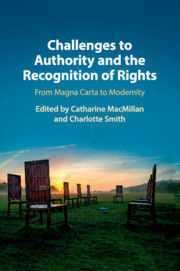
-
Select format
-
- Publisher:
- Cambridge University Press
- Publication date:
- August 2018
- August 2018
- ISBN:
- 9781108554336
- 9781108429238
- 9781108453363
- Dimensions:
- (228 x 152 mm)
- Weight & Pages:
- 0.63kg, 358 Pages
- Dimensions:
- (229 x 152 mm)
- Weight & Pages:
- 0.6kg, 362 Pages
- Subjects:
- Legal History, British History: General Interest, Law, History
You may already have access via personal or institutional login- Subjects:
- Legal History, British History: General Interest, Law, History
Book description
While challenges to authority are generally perceived as destructive to legal order, this original collection of essays, with Magna Carta at its heart, questions this assumption. In a series of chapters concerned with different forms of challenges to legal authority - over time, geographical place, and subject matters both public and private - this volume demonstrates that challenges to authority which seek the recognition of rights actually change the existing legal order rather than destroying it. The chapters further explore how the myth of Magna Carta emerged and its role in the pre-modern world; how challenges to authority formed the basis of the recognition of rights in particular areas within England; and how challenges to authority resulted in the recognition of particular rights in the United States, Canada, Australia and Germany. This is a uniquely insightful thematic collection which proposes a new view into the processes of legal change.
Reviews
‘… the book makes a number of insightful and novel contributions to scholarship both on Magna Carta itself and its legacy … of interest and relevance to contemporary lawyers both public and private. The book should also be additionally praised for not being jurisdictionally limited to England …’
Robert Brett Taylor Source: Comparative Legal History
Contents
Metrics
Altmetric attention score
Full text views
Full text views help Loading metrics...
Loading metrics...
* Views captured on Cambridge Core between #date#. This data will be updated every 24 hours.
Usage data cannot currently be displayed.
Accessibility standard: Unknown
Why this information is here
This section outlines the accessibility features of this content - including support for screen readers, full keyboard navigation and high-contrast display options. This may not be relevant for you.
Accessibility Information
Accessibility compliance for the PDF of this book is currently unknown and may be updated in the future.


